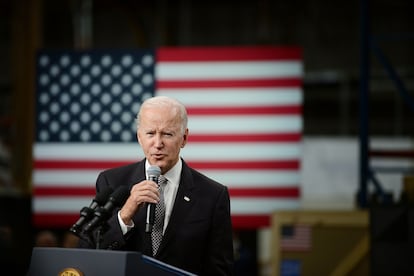Biden announces thousands of pardons for marijuana possession
The move only affects individuals convicted on federal charges, and the US president urged state governors to follow his lead as the country heads towards midterm elections in November


US President Joe Biden on Thursday announced pardons for people convicted on federal charges of simple marijuana possession. The highly symbolic gesture eliminates another hurdle on the path towards a full decriminalization of cannabis, which is already legal in many states: 37 allow it for medical purposes, and in 19 of these, adults are also allowed to use marijuana recreationally. Even so, the majority of convictions for drug possession stem from state charges, not federal ones.
“As I often said during my campaign for president, no one should be in jail just for using or possessing marijuana. Sending people to prison for possessing marijuana has upended too many lives and incarcerated people for conduct that many states no longer prohibit,” said Biden in a White House statement.
“Criminal records for marijuana possession have also imposed needless barriers to employment, housing, and educational opportunities. And while white and Black and brown people use marijuana at similar rates, Black and brown people have been arrested, prosecuted, and convicted at disproportionate rates,“ added the president.
Too many lives have been upended because of our failed approach to marijuana. It’s time that we right these wrongsUS President Joe Biden
Officials estimate that these pardons will affect about 6,500 people convicted under federal law between 1992 and 2021, as well as thousands of others in the District of Columbia. Nobody is currently serving time in federal prison for these minor offenses, but the criminal record can be an obstacle to getting a job or finding housing. People convicted of selling or distributing marijuana are not included in the pardons.
Biden said he has asked Attorney General Merrick Garland to start working on certificates of pardon for eligible individuals, and urged state governors to follow his lead. “Just as no one should be in a federal prison solely due to the possession of marijuana, no one should be in a local jail or state prison for that reason, either,” he said.
The president also said he would ask for a review of how marijuana is currently categorized. Under federal laws, it is considered a Schedule 1 drug, reserved for the most dangerous substances and on the same level as heroin or LSD, “and even higher than the classification of fentanyl and methamphetamine – the drugs that are driving our overdose epidemic,” said Biden. “Too many lives have been upended because of our failed approach to marijuana. It’s time that we right these wrongs.”
Pro-legalization activists immediately celebrated the news. So did contenders in the upcoming midterm elections, including the charismatic candidate for Pennsylvania state senator, John Fetterman, who has made cannabis legalization a leading issue of his campaign. On Thursday night, he tweeted: “We did it, Joe.”
Biden’s gesture also has political overtones. White House advisors are candid about the fact that this announcement could encourage young adults and Black Americans – two groups that are disproportionately targeted by police for marijuana possession – to vote in the November 8 midterm elections. Both chambers of Congress are up for grabs (all the seats in the House of Representatives and a third of those in the Senate are at stake), and polls are forecasting that Democrats will lose their current majority in the lower chamber.
Tu suscripción se está usando en otro dispositivo
¿Quieres añadir otro usuario a tu suscripción?
Si continúas leyendo en este dispositivo, no se podrá leer en el otro.
FlechaTu suscripción se está usando en otro dispositivo y solo puedes acceder a EL PAÍS desde un dispositivo a la vez.
Si quieres compartir tu cuenta, cambia tu suscripción a la modalidad Premium, así podrás añadir otro usuario. Cada uno accederá con su propia cuenta de email, lo que os permitirá personalizar vuestra experiencia en EL PAÍS.
¿Tienes una suscripción de empresa? Accede aquí para contratar más cuentas.
En el caso de no saber quién está usando tu cuenta, te recomendamos cambiar tu contraseña aquí.
Si decides continuar compartiendo tu cuenta, este mensaje se mostrará en tu dispositivo y en el de la otra persona que está usando tu cuenta de forma indefinida, afectando a tu experiencia de lectura. Puedes consultar aquí los términos y condiciones de la suscripción digital.








































